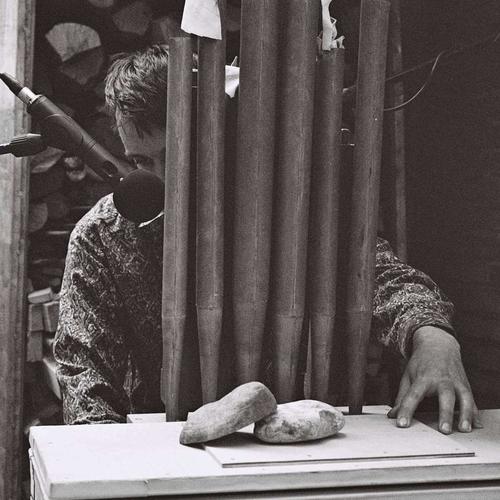
Sholto Dobie
In my work, I create my own instruments with analogue technologies. The instruments I make draw on the functions and designs of folk and traditional wind instruments, such as bagpipes and organs. Their appearance several thousand years ago, for me, represents a technological shift in music, as humans extended the reach of their lungs, by creating bellows, bags and reservoirs that could sustain flutes and reeds more easily and for longer than human lungs, a drive that is echoed in more recent technological socio-musical shifts, electronic dance music, for example.
The anthropomorphic appendages (the working parts of organs and bagpipes) hold a tricky magic of sorts. Inflating and deflating bags and valves have an uncanny presence that is reminiscent of medical equipment, fish bladders, balloons...eerie and playful. That may be attributed to their not-quite human-ness. When it comes to my own work, I'm interested in that not-quite zone, as a destabilizing force.
More recently as part of a commission with Counterflows Festival in Vietnam, I have began to incorporate analogue electronics alongside handmade reed pipes, using basic prefabricated timer modules and industrial electric valves, to control air flow. Despite their apparent limitations, this simple set up, belies a rich world of sonic and technological possibilities, and despite the functional origins of the technology, they can be reorganized, misused, giving them their own particular agency and voice.
The role of technology in my work, then, is very much that of a co-creator, one that assists in the creation of trickery. Working with these tactile and sometimes clunky technologies, allows me to occupy an in-between role of player and assistant, performer and listener… which I think gives space for audiences to negotiate their own roles and positions within the sound and music.
The technological possibilities of air pumps and industrial tubing mean an instrument can be room-sized, with multiple pipes diffusing sound sources throughout an acoustic structure. So when I work with spaces a similar logic is applied. Instruments (and their technologies) are imagined, not as tools to an end, but rather as part of the shifting matrix of spaces, acoustics, audience and performer that make up the environment.
After a prolonged period of touring and live performances the residency would give me the opportunity to build upon these recent developments and deepen this research enquiry, through a combination of studio practice and theoretical research. The framework of the tekhne residency would allow me to contextualise my practice alongside like minded artists and thinkers, and elaborate on the role of technology as a material within my work.
Bio:
Sholto Dobie was born in Edinburgh and lives in Vilnius. He is an artist and organizer working with sound in it's broadest sense. He regularly performs in events, using loose structures, site specific methodologies and an array of sound sources including home-made organs and bagpipes. Over the years, he has explored ideas related to folklore, environment a sonic phenomenon.
He is based in Vilnius where he co-organises the artist run space Studium P and curates a regular event and radio series for local and international experimental music called Progine. He has recorded and performed with artists and musicians including Rie Nakajima, Judith Hamann, Lia Mazzari, Shakeeb Abu Hamdan, Ahti & Ahti, Antonina Nowacka, Malvern Brume, Lucia Nimcova and in the group Lo Escucho Lo Pinto.
He has released solo and collaborative music with labels such as Mappa, All Night Flight, Kashual Plastik, Infant Tree, Takuroku, Penultimate Press and Thanet Tape Centre.
He has toured widely, presenting performances at Cafe Oto (London), Fylkingen (Stockholm), De Player (Rotterdam), KM28 (Berlin), Kraak Festival (Antwerp), Organ Sound Art Festival (Copenhagen), Jauna Muzika Festival (Vilnius), Counterflows Festival (Glasgow) and most recently in Vietnam as part of the Counterflows / Len Ngan project Thanh Canh.